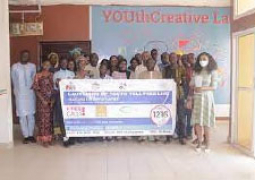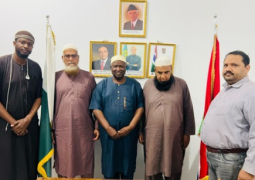
The 15th heads of state and government summit of OIC is the second largest gathering of world leaders after the UN General Assembly. It was held under the theme “Enhancing Unity and Solidarity Through Dialogue for Sustainable Development.”
The aim of WICS is to promote Islam worldwide through peaceful means, in particular by spreading Islamic culture and the Arabic language, promoting peace and international cooperation, classifying Islamic law, compiling and publishing reference works and creating centres of education.
On the sidelines of the OIC Summit, Dr Al-Fakhri and his delegation from Libya visited their areas of intervention as well as also met the leaders of the Gambia Supreme Islamic Council.
Sheikh Issa F. Darboe, president of the Gambia Supreme Islamic Council assured WICS of his council’s continued resolve in propagating Islam. He noted that the gathering was in line with the teachings of Islam.
Dr. Al-Fakihri said WICS is a non-governmental organisation and non-profit making institution that works assiduously to help the poor and needy in society.
He indicated that Islam as a religion has not proscribed itself of such undertakings since its emergence in the time of prophet Muhammad (S.A.W). “The public treasury for instance, was a place where Zakat was accumulated for the welfare of society especially the poor and needy,” he said.
“This shows why today we have so many Muslim non-governmental organisations, an example of which is the World Islamic Call Society, which has tried in its own little way to help needy communities with schools, orphanages, clinics, water wells and other aids. On the other hand, Islam has always laid emphasis on social responsibility,” he mentioned.
According to him, the Islamic teachings regard the Islamic community as one Ummah and therefore ordered Muslims in all aspects to cooperate with one another. “This is why Allah mandated able and wealthy Muslims to give out a specific rate of their wealth or money in order to extend a helping hand to the poor and advocates social responsibility. This principle and understanding can be equivalent to the aspirations of an NGO,” he stated.
Read Other Articles In National News
GDC youth leader debunks reports of joining NPP
Mar 26, 2021, 12:10 PM




